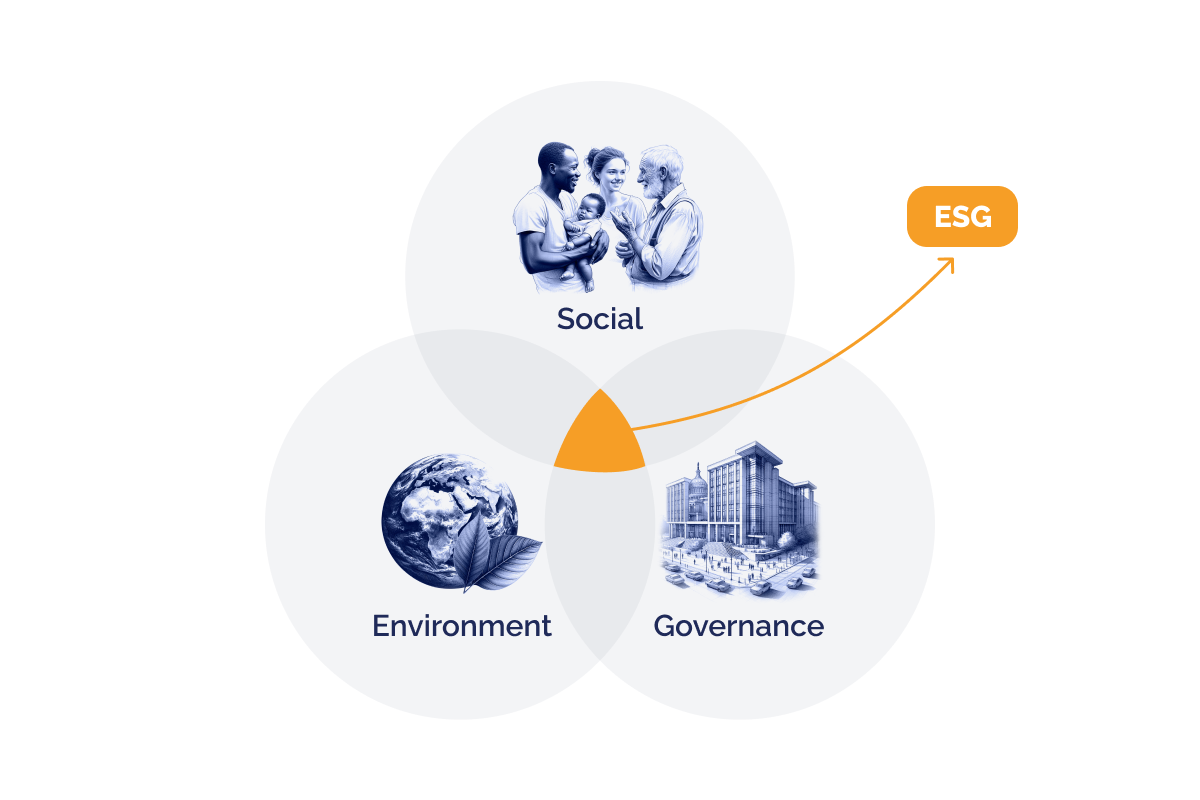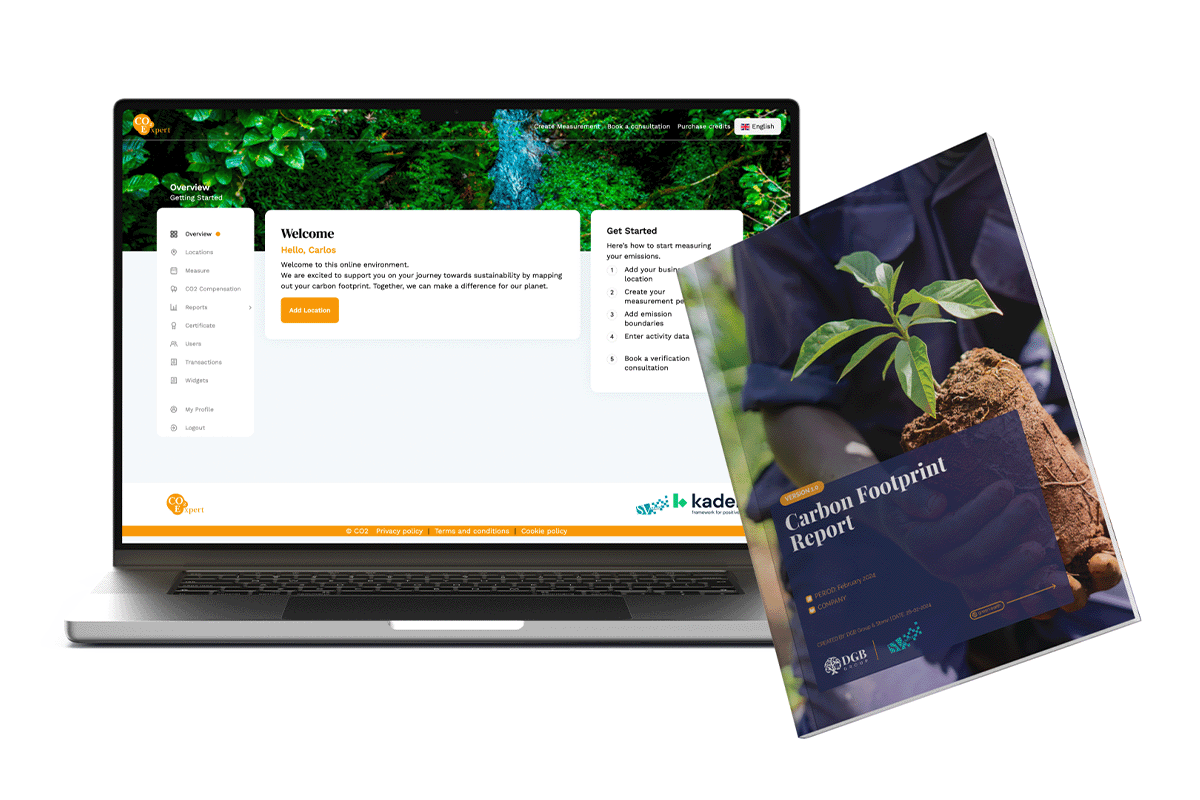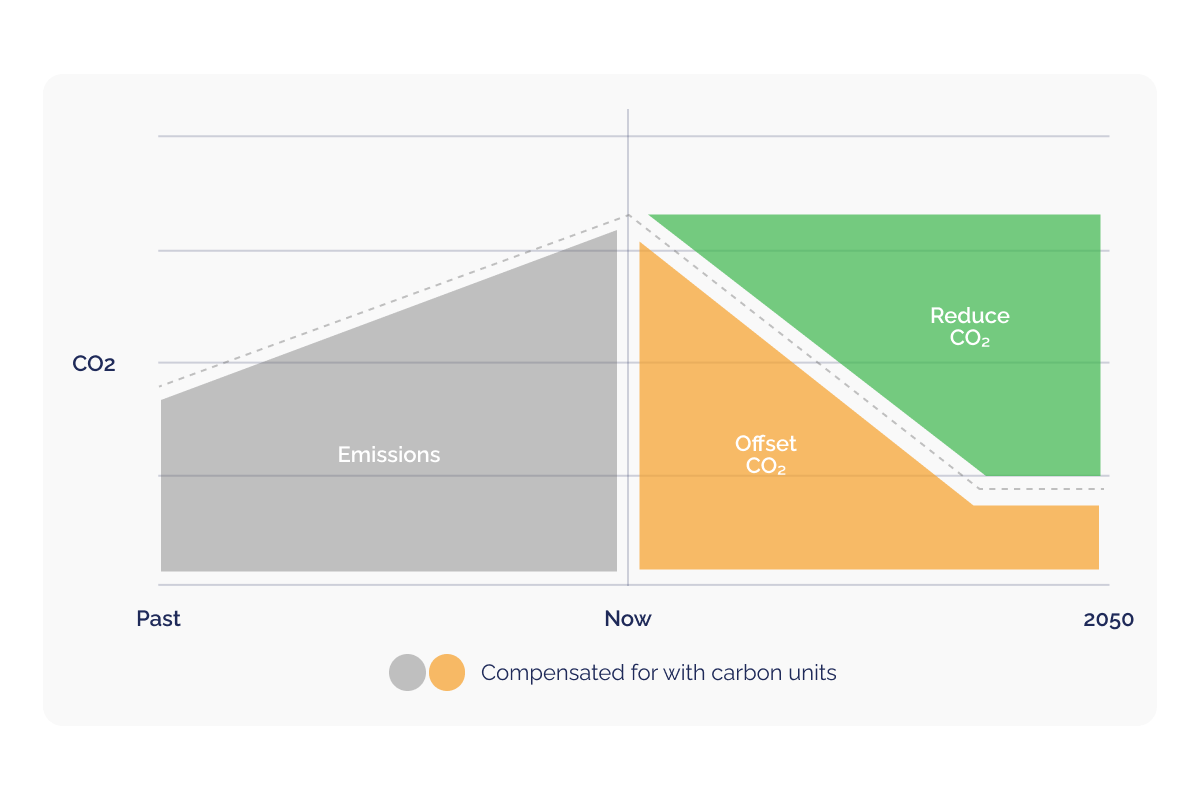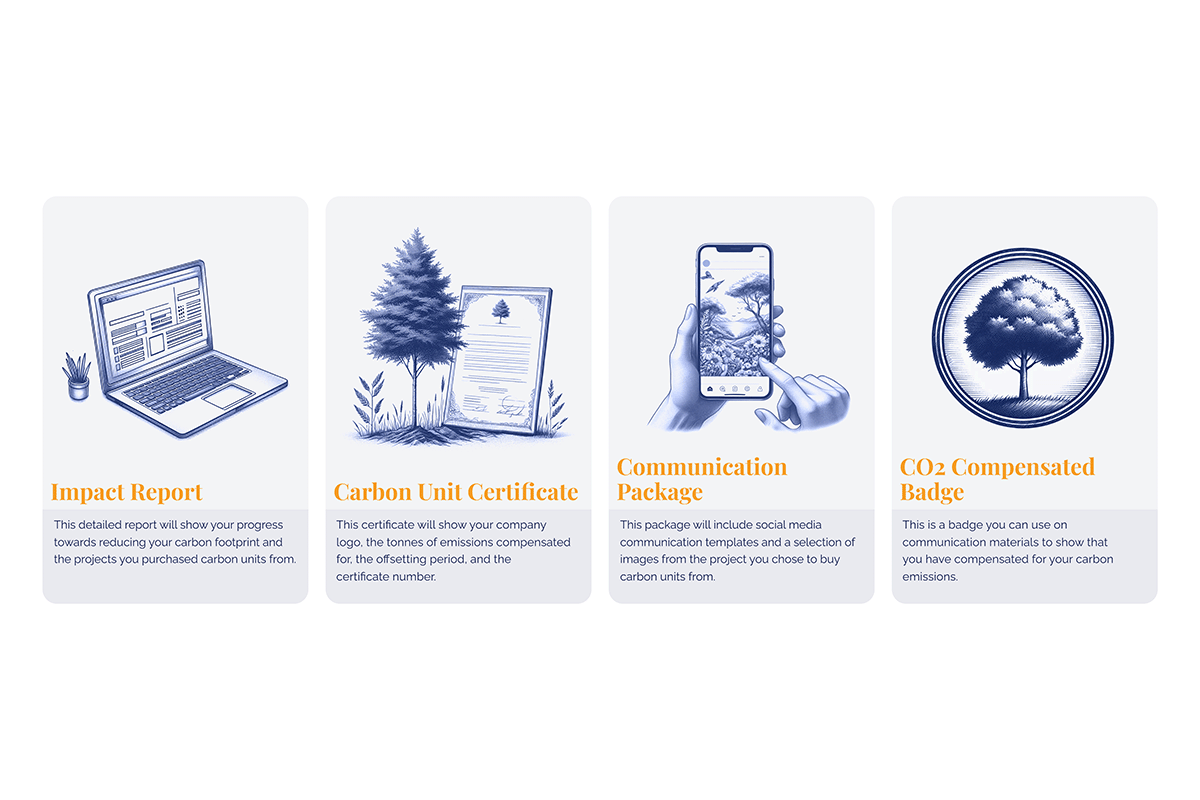In today's business landscape, sustainability is more than just a buzzword—it's a necessity. Companies face increasing pressure from clients, stakeholders, and regulators to demonstrate their commitment to environmental responsibility. As a business owner or sustainability manager, you might be wondering where to start and how to effectively make your company more sustainable.
 Close-up of young trees, park and city in the background. AI generated picture.
Close-up of young trees, park and city in the background. AI generated picture.
Sustainability in general refers to meeting the needs of the present without compromising the ability of future generations to meet their own needs. From a business perspective, this means responsibly managing resources and addressing your environmental impact known as your carbon footprint.
In April 2021, the European Commission adopted the proposed Corporate Sustainability Reporting Directive (CSRD) which reforms and greatly increases the scope of reporting previously required of EU companies. The increase in scope means that from 2023 almost 50,000 companies in the EU will now have to report on ESG aspects. ESG consists of three pillars: Environmental, Social, and Governance.
Read more: What is CSRD and how does it affect your business?
ESG is a set of practices and metrics used to evaluate a company beyond its financial risks and opportunities. It is generally used to measure a company’s sustainability. Investors use ESG frameworks to holistically assess a company's sustainability efforts and societal impact. ESG are not only relevant under the CRSD; it is a global framework that is increasingly applied by stakeholders to evaluate a business.
 Illustration explaining ESG.
Illustration explaining ESG.
The world today is faced with several critical global issues: climate change, the shift from a linear to a circular economy, growing inequality, and the need to balance economic and societal demands. Investors, regulators, consumers, and employees are increasingly insisting that companies must manage not only financial capital but also natural and social capital. Additionally, companies need to establish effective governance frameworks to support these responsibilities.
But where does your business fit into all this? And how can you make your business more sustainable? The first step in overcoming sustainability challenges is to understand and clarify your business goals.
Setting your business goals
When evaluating the goals or targets of your business in relation to sustainability, whether you are a small, medium, or large business in any industry, you have to think of what you ultimately wish to achieve. Your strategy might include some of these aims:
-
Enlarge your client base by aligning with sustainable practices.
-
Be regarded as a green company with strong environmental accountability.
-
Appeal to eco-conscious consumers and enhance your brand’s image.
-
Enhance your brand reputation through sustainable initiatives.
-
Achieve your company’s net-zero carbon emissions goal by 2030.
-
Highlight your commitment to net-zero goals in marketing campaigns.
-
Comply with investor demands on ESG criteria.
-
Comply with emerging environmental regulations and standards.
-
Engage employees in sustainability initiatives and create a green company culture.
-
Enhance the growth and operational efficiency of your business through sustainability.
Read more: The power of sustainability: Why investing in sustainability drives faster company growth
Identifying challenges
Now that you have identified your business goals, you may wonder how you will achieve those in light of the challenges you face in aligning your business with sustainability. Many business owners struggle with:
-
Knowing where to start.
-
Obtaining the necessary resources or data.
-
Having limited funds or expertise in sustainability.
-
Understanding the technical aspects of a sustainability strategy and carbon footprinting.
-
Balancing sustainability investments with budget constraints.
-
Finding the right solutions for your business.
-
Understanding carbon footprint compensation and reduction.
-
Navigating the complexity of the carbon credit market and verifying project legitimacy.
-
Managing stakeholder expectations for immediate and tangible results.
-
Tracking and reporting comprehensive sustainability metrics.
Read more: How to stay ahead of the curve on sustainability
Addressing your needs
To meet these challenges in achieving your business goals, you have to consider your business needs and what resources or tools might help you in overcoming these challenges. Examples of business needs in addressing the above challenges may include:
-
Easy-to-use tools for calculating and tracking carbon emissions.
-
Expert partners to advise on the process of carbon footprint measurement, compensation, and reduction.
-
Guidance on developing and implementing an effective and custom sustainability strategy.
-
Comprehensive data and reports to support decision-making.
-
Transparent reporting to showcase your environmental impact.
-
Cost-effective custom solutions on carbon footprint measurement and carbon mitigation.
-
Reliable partners who provide high-quality, verified carbon solutions like carbon units.
-
Impactful marketing materials that showcase your sustainability efforts.
-
Immediate solutions to address current business impacts.
-
Ongoing support in managing and reporting on your carbon footprint and sustainability efforts.
Read more: How to use DGB Group's carbon footprint calculator on your journey to net zero
Solutions for your business
Starting the process to make your business more sustainable and environmentally responsible can seem challenging. But with the right partners, tools, and advice, you can reach your goals more quickly and easily than you may expect. You can also start small and benefit later from the steps you have chosen to take today.
So, where do you start?
1. Carbon footprint measurement
Start simple. The first part of any sustainability goal and reporting framework is knowing your impact. This is the basis on which you will set future goals and progress.
Learn how to measure your carbon footprint: download our free brochure
With DGB Group’s advanced CO2 Expert tool and expert guidance, you can accurately measure your carbon footprint. Using our tool, you can decide on your emissions scope, add locations and data, and easily calculate your carbon emissions. You can also manage or review your carbon footprint directly or compare and benchmark your results. Our tool is also cost effective and can be accessed by any subscribed colleagues or individuals in your company.
 CO2 Expert tool and Carbon Footprint Report.
CO2 Expert tool and Carbon Footprint Report.
Our experts will guide you through using the tool and show you how to collect and input data. Our tool automatically converts this data into CO2 emissions and our measurements comply with international guidelines ISO 14064, PAS 2060, and the GHG Protocol.
After you have provided all your data and supporting documentation, carbon footprint validation takes about 4–8 weeks to complete. We will then provide you with a carbon emissions report, showing your total carbon footprint.
Therefore, if you start today to measure your carbon footprint, in less than two months from now, depending on the speed of your data delivery, you can achieve the first milestone in your sustainability journey.
Read more: Sustainability simplified: Carbon footprinting for beginners
2. Carbon reduction strategy
The next step in achieving your goals is addressing your carbon footprint. This involves developing a carbon reduction strategy. A carbon reduction strategy consists of two parts: carbon compensation and carbon reduction.
Carbon compensation
Not all emissions from your business can be reduced and carbon reduction can take time. Carbon compensation is about taking responsibility for your carbon footprint by compensating for past emissions or emissions that cannot be reduced. This can also be done immediately to address your impact and report to stakeholders while you are implementing other reduction strategies.
Learn more about compensating with carbon units: download our free brochure
Carbon reduction is done with carbon units—also known as carbon credits. Each carbon unit purchased represents 1 tonne of CO2 emissions removed or avoided by verified carbon projects like DGB’s nature-based projects. These units are then used to compensate for your irreducible emissions, after which they are retired. You can choose from any of our projects that resonate with your values and goals to compensate for your emissions.
 Illustration showing carbon reduction and compensation chart.
Illustration showing carbon reduction and compensation chart.
For eg: If your business’ irreducible emissions across Scope 1, 2, and 3 are 100 tonnes, you can purchase 100 carbon units to compensate for this impact.
Read more: Sustainability simplified II: Carbon units for beginners
All our carbon units are verified by leading international standards to ensure their quality and impact. Our carbon units are also generated by projects that offer numerous benefits in addition to carbon mitigation, such as biodiversity enhancement, habitat restoration, and community empowerment through job creation, training, and improved health.
Explore our impactful projects
Carbon compensation can be done immediately after your carbon footprint calculation. You can compensate for your footprint directly via the CO2 Expert tool by choosing your favourite project and the amount of CO2 you wish to compensate for. You can directly purchase carbon units via the tool or by contacting one of our Environmental Solutions Managers.
We also offer discounted rates for future carbon unit purchases. In addition, DGB helps you market this momentous milestone by providing you with a communication package that includes a personal impact report, social media support, project photos and videos, and a CO2-compensated badge that can be used for marketing materials.
 DGB communication package.
DGB communication package.
Carbon reduction
Part of the carbon reduction strategy is carbon reduction. This part is vital for companies that want to become carbon neutral or reach net zero and involves implementing long-term measures to reduce carbon emissions and implement sustainable business practices.
Contact us to start your carbon reduction strategy
DGB can help you set and achieve your decarbonisation goals and will provide you with a reduction strategy report, which includes impactful carbon reduction strategies and an inventory of reduction measures with energy savings. Carbon reduction can take time and requires a holistic evaluation of your business operations.
While carbon reduction takes time, compared to carbon compensation which can be achieved immediately, it offers you many benefits like cost savings by eliminating operational inefficiencies. A carbon reduction strategy can be developed and delivered within a few weeks after your carbon footprint measurement.
Read more: Era of revolution: groundbreaking carbon market development
Implementation and impact
In as little as four months from today, your business can make substantial progress towards achieving its sustainability goals. It can measure its carbon footprint, compensate for its emissions, and set up a carbon reduction strategy in line with your sustainability targets. In addition, you can market your achievements and report on your progress.
These efforts are exceedingly valuable. They contribute to your overall sustainability goals, boost your brand, attract eco-conscious customers, and align with investor expectations, regulatory changes, and ESG reporting criteria.
To achieve your sustainability goals, it benefits your business to start now. To avoid missed opportunities, higher costs, and increased regulatory pressure, start small and benefit tomorrow.
Start today: measure your carbon footprint
Becoming sustainable with DGB Group
DGB provides a one-stop solution for your CO2 strategy. We assist you in transitioning to net zero and becoming more sustainable by helping you with detailed emissions reports, energy savings, carbon reduction strategies, and carbon compensation. Our carbon solutions are also tailored to fit your budget and needs.
 Close-up of a DGB team member planting a tree seedling. Hongera Reforestation Project, DGB.
Close-up of a DGB team member planting a tree seedling. Hongera Reforestation Project, DGB.
Our large-scale carbon projects focus on nature conservation through nature-based solutions. They help companies not only reduce their carbon footprint but also make a positive environmental and socio-economic impact. Compensating with DGB goes beyond carbon; our high-quality projects revitalise biodiversity, restore ecosystems, and uplift local communities.
Because we are a project developer, you are directly connected to your carbon offset project without extra intermediaries. We are committed to transparency, reliability, and measurable impact, ensuring your sustainability efforts are tangible.
Talk to us about your concerns, needs, and goals. We are here to help you join the global movement towards sustainability and benefit from becoming environmentally responsible.
Contact us to start your sustainability journey








